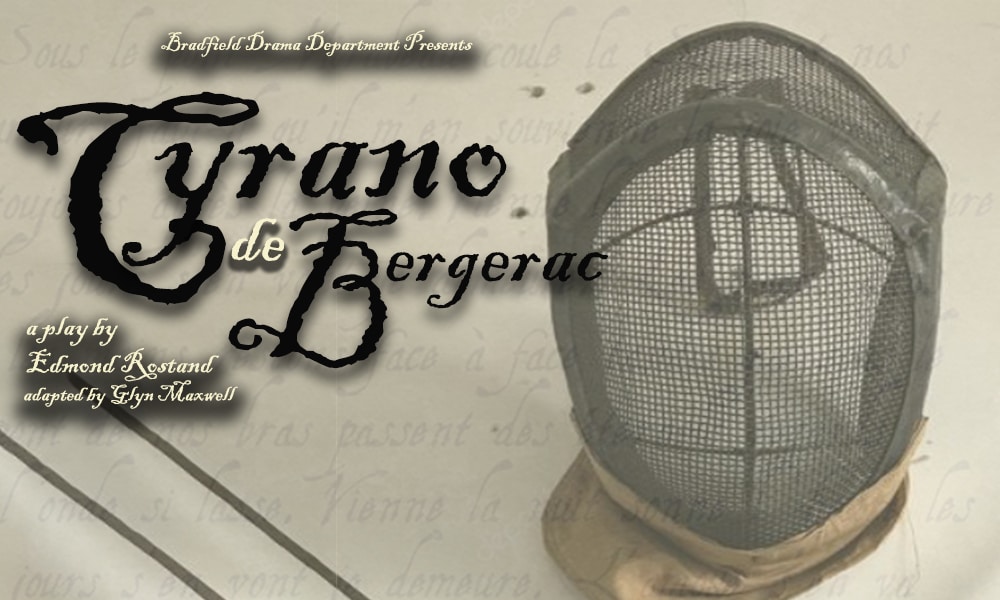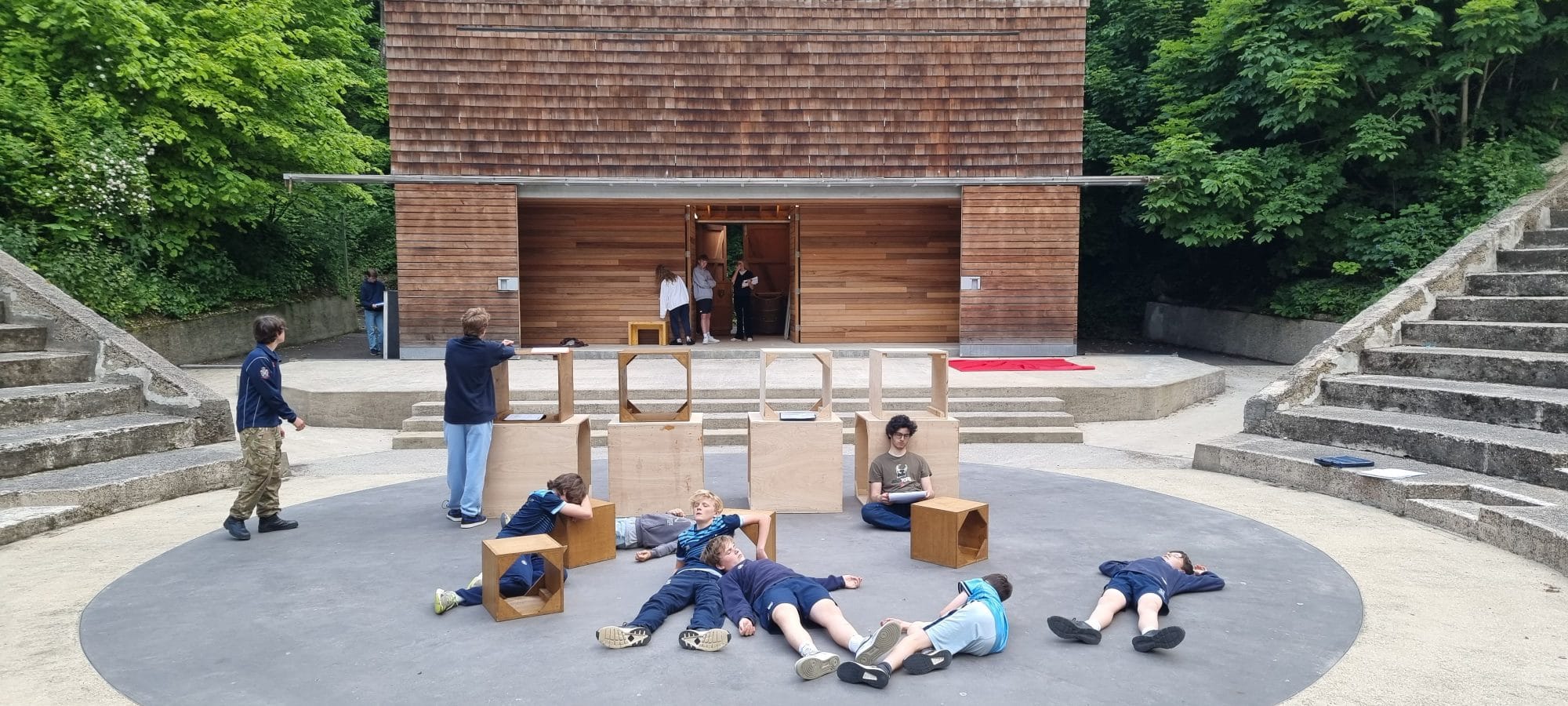
DIRECTOR’S NOTE
Choosing the play that was to be the Summer Production 2022 was a surprisingly difficult endeavour. The last few years have put the usual ‘Greek Play – Shakespeare – Musical’ rotation out of order, meaning that this year was supposed to be a Shakespeare. However, given that this would be the first fully staged play in Greeker where the cast does not need to bubble, nor do the staff running the production need to isolate each time someone coughs, I wondered how I could continue the joy and laughter that The Great Big Talent Show brought back to Bradfield last year. Shakespeare can obviously do this, with plays like A Midsummer Night’s Dream or, my personal favourite, Much Ado About Nothing, but I wanted something slightly different for my first Greeker school production. After getting the ‘all clear’ from the relevant parties to move away from the norm, I set about finding a play that was big enough to cast between twenty and thirty pupils, old enough to be held up against a Shakespeare, and something that we could really play with. Eventually the decision came down to A Servant to Two Masters by Carlo Goldoni, but the cast would only total 12, The Country Wife by William Wycherley, but it was a little too smutty for a school production, and Cyrano de Bergerac by Edmond Rostand.
At the time I was making the decision, there was a production mounted in London by the Jamie Lloyd Company, with James McAvoy playing the titular role. I had already purchased the script of this particular production with an aim to use it and took myself off to London to see it one half term evening. Little did I realise how far Jamie Lloyd had gone with the modernisation, staging a rap battle instead of a sword fight, using a completely bare stage apart from some orange plastic school chairs and even adding in a twist that I don’t think anyone saw coming which I’ll happily share this with you if you can find me! I also realised that the language used in the production was definitely NOT for a school production, which led me to the Glyn Maxwell version. This adaptation of the original Edmond Rostand play has been amended so that all of the minor roles are played by the Nuns we meet at the beginning. However, to fit with the cast size I needed, I split the majority of these roles out to increase from 12 to 26.

For those who don’t know, Cyrano is all about the words. The character is a skilled wordsmith, raconteur and swordsman, who has developed his vocabulary so that his intelligence can detract from his most hated, self-identified flaw – his huge nose. He is absolutely convinced that he is unlovable because of his bulbous facial appendage, especially by Roxane, his second cousin whom he has adored since childhood. When the opportunity presents itself in the guise of the incredibly good looking Christian de Neuvillette, who is as handsome as he is dumb, Cyrano jumps at the chance to use Christian to tell Roxane daily that he loves her. Even when sent to war for France against Spain, Cyrano finds a way to get letters to his love.
The main reason I chose this play above the others is the way that it treats the audience. It starts off humorously, making us fall in love with the characters and becoming champions for both Cyrano and Christian, before settling us into an unease when the Cadets are called off to War. Without wishing to ruin the ending, I will admit to shedding a tear during the rehearsal process at the culmination of the story. The play is funny, carefree, touching and emotive all at once. It shows that everyone can be loved regardless of how they see themselves and that usually we are our own worst enemies when it comes to love.
Having now chosen the play and shared the choice amongst some of the staff, the initial response was often: “So how are you going to tackle the nose thing?” To be completely honest, this was not something I had seen as an issue until I was asked that question on more than a few occasions. Having panicked slightly that this supposedly controversial subject could essentially cause a lot of upset, I went through a few iterations of how I could replace ‘the nose’. The two original films cast Gerard Depardieu and Steve Martin as Cyrano, but both used ‘the nose’. More recently, a film with Peter Dinklage playing the role came out in 2021. In this version they played on his height as the insecurity. As Dinklage himself said: “If you get rid of the nose, what are you left with? You’re left with a guy who’s just incapable of seeing himself worthy of love being returned to him, based on what he feels about himself.” After seeking advice from a few people on it, I decided to leave it as is. The nose is, perhaps, the best-known thing about Cyrano de Bergerac and I think it would be dangerous to remove it.
This production has been so much fun to work on and I cannot tell you how dedicated the entire cast and crew have been. Even when there was a thunderstorm one Tuesday evening and we had to move to the Old Gym to rehearse, contending with the hail on a tin roof was used to our advantage. It has been a real joy for us all and I hope you come away from the play this evening having felt all of the emotions. I know we certainly have over the past six weeks of rehearsals.
Rosie Davies, June 2022

THE REAL CYRANO DE BERGERAC

Little do people know, but the Edmond Rostund play was based on the life of an actual person. The real Cyrano de Bergerac was indeed a novelist, playwright and duellist in the 17th century, like the Bergerac seen on stage today. However, even though the play of 1897 is based on the real Savinien de Cyrano de Bergerac, it is often not much more than invention and myth.
Born in March 1619, Bergerac’s life was short and poorly documented and what little that is known of him was provided in a preface by Henri Le Bret in Bergerac’s The Voyages to the Moon and the Sun. Le Bret was a good friend of Bergerac’s from childhood and thanks to him we have a better, though still limited, understanding of the man himself. He was born into a wealthy household, schooled by a priest and sent to continue his studies in Paris at the age of 12. At 19 Cyrano joined the infantry which led him to fight at the Siege of Arras. He was badly wounded in this battle against the Spanish and ended up studying under the intellectual Pierre Gassendi. Gassendi’s libertine philosophies had a profound effect on Bergerac who ended up writing two of his best-known works, Histoire comique des états et empires du soleil and Histoire comique des états et empires de la lune. These are often known collectively in English as The Voyages to the Moon and the Sun whilst working under Gassendi. These were not published until after Bergerac’s death, with the preface by Henri Le Bret. Bergerac also wrote a few plays and some letters, though he is more famously known because of the Edmond Rostand play.
Little is known about Bergerac’s death at the age of 36, though it has been suggested that he died in an asylum, having been forced there by his brother Abel during his last days. This was supposedly because ‘the artist in him had turned mad with numerous ideas’. It has also been suggested that his fatal injuries were caused by a falling wooden beam, as is reflected in the Rostand play. However, neither of these have been proven to be factual and the death of the real Cyrano de Bergerac will remain a mystery.
CAST AND CREW
Cyrano de Bergerac Harry Saunders
Christian de Neuvillette Ben Braje
Count Antoine de Guiche Luc Golding
Le Bret Jackson Frieda
Ragueneau Lola Clarke
Roxane Clemmie Faure
Mother Margaret/Duenna/Cuigy Sophie Banfield
Sister Claire Evie Breslin
Sister Teresa/Thief/Clomire Immy Carlier
Sister Martha/Busybody/Gremione Sophia Jenkins
Sister Agnes/Brisaille Lottie Klafkowska
Sister Agnes/Brisaille (1 performance) Bea Moore
Sister Rosa/Orange Girl Daisy Brewer
Ligniere Luca Taylor
Valvert Archie Bunbury
Montfleury Josh Carlier
Lise Emma Leeke
Priest Griff Beaugeard
Carbonne Will Morriss
Sentinel Luke Robson
Cadet 1 George Murray
Cadet 2 Wilf Barnett
Cadet 3 Seb Kirk
Cadet 4 Tom Kerley
Cadet 5 Lukas Schmidt
Cadet 6 Tom Sinclair
Understudies Seb Kirk and Bea Moore
Fencers Alex Wright & Luca Taylor
Staging Jason Thomas and The Estates Team, Dobek Nowicki
Lighting Dobek Nowicki
Sound James King
Stage Manager Matt Keel
Costumes Rosie Davies, Georgia Mussellwhite & Silvia Serra Scott
General Manager Georgia Mussellwhite
Director Rosie Davies
THANKS TO
Oliver Schreiber, Steve Wallace, Mark Price, Roger Wall, Tara Williamson, Tina Osman, Reka Gemisi, Nic Saunders, Phil Davies, Joshua and Oscar Davies, Matt Fyson at Bapty, The Bradfield College Estates Team and The National Theatre Costume Department.

